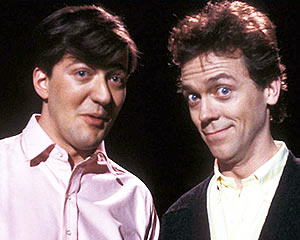A Bit On The Bits From A Bit Of Fry & Laurie
Published on November 29th, 2009 in: Comedy, Culture Shock, Issues, OMG British R Coming, TV |By Jimmy Ether
To misappropriate one of my favorite quotes, writing about comedy is like dancing about architecture. It’s difficult to articulate what it is about something that really makes us laugh. Like music, humor touches us deep down at the core. It reaches into our baser instincts where fear, sexual desire, and the cravings for candy reside. On paper, a skit appears to be trite silliness. The analysis obscures the subversive nature of great comedy in which it fights to acknowledge the world and our lives as a ridiculous, nonsensical mess—and then laugh at it.
Stephen Fry has become one of my heroes. I follow him on Twitter, laugh along with his giddy wit, silently commiserate with his ruts, and appreciate his unrestricted, loving openness with the world. That’s a rare and truly caring trait. And then, there’s Hugh Laurie. I think everyone wants at times to be like the character he plays on House, MD—to have unabashed, selfish motivation and openly mock that which is ordinary, dim-witted, and emotionally-ruled.

Those polar opposite qualities were what I expected as I started digging though Season One of A Bit of Fry & Laurie. And that was all in there, but it turned out that the roles I assumed from Fry and Laurie were reversed. Stephen Fry’s style is more the marriage of Monty Python‘s John Cleese and Graham Chapman, often playing the egomaniacal intellectual, the pretentiously outraged upper-class businessman, or the jaded authoritarian. Hugh Laurie, on the other hand, is a bit of Michael Palin mixed with Eric Idle. He handily plays the well-meaning dolt, the nervous straight man, or the eager-to-please company underling.
It’s nearly impossible to discuss British comedy post-1970 without comparing it to Monty Python. Like the Beatles did for rock, Python has left a mark on nearly everything that that followed. And Python has definitely informed the sketch style of A Bit of Fry & Laurie. But where Python is often silliness for the simple joy of absurdity, Fry & Laurie goes in an almost Dada direction by exploring irrationality and exposing blind sentimentalism. This even extends to Fry and Laurie making commentary on their own skits, which often halt mid-stream to acknowledge the bit or break the fourth wall out of character to admit their motivation.
But more than anything, Fry and Laurie seem to relish in twisting and contorting language. There is a poetic sensibility to the dialog. In fact, Fry explains the duo’s passion for language best himself in Season One:
“Language is my mother, my father, my husband, my brother, my sister, my whore, my mistress, my check-out girl. . . language is a complimentary moist lemon-scented cleansing square or handy freshen-up wipette. Language is the breath of God. Language is the dew on a fresh apple, it’s the soft rain of dust that falls into a shaft of morning light as you pluck from a old bookshelf a half-forgotten book of erotic memoirs. Language is the creak on a stair, it’s a spluttering match held to a frosted pane, it’s a half-remembered childhood birthday party, it’s the warm, wet, trusting touch of a leaking nappy, the hulk of a charred Panzer, the underside of a granite boulder, the first downy growth on the upper lip of a Mediterranean girl. It’s cobwebs long since overrun by an old Wellington boot.”
—Watch it here.
Yet they are just as quick to mock their own poetic sensibilities while somehow simultaneously satirizing the need of media to pander to the cultural lowest common denominator, as shown in this “Suitable Poetry” clip from the BBC.
Fry and Laurie are also fond of the contrasts between high- and lowbrow humor, for example, diffusing the headiness of theology with sex:
“Glen is having a little difficulty concentrating on our Bible study readings because he has something of an obsession with the size of my girlfriend’s breasts.”
—Watch it here.
Each episode affords Hugh Laurie a segment to showcase his music abilities. His songs are generally a send-up of rock clichés and the banal lyrical themes of the day, like in “Song for America” where he mocks the Bruce Springsteen- and Randy Newman-style ballads of American romanticism.
The more I dig into the series, the more endearing both Fry and Laurie become and the more I realize the nuances of what they were trying to achieve. If you are a fan of British Comedy, you owe it to yourself to get your hands on the all-too-short four seasons of A Bit of Fry & Laurie.
One Response to “A Bit On The Bits From A Bit Of Fry & Laurie”
December 1st, 2009 at 11:34 am
The clips you linked to are hilarious! I think I need to add these DVDs to my queue pronto.
LLM
Time limit is exhausted. Please reload the CAPTCHA.